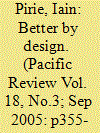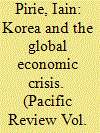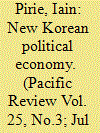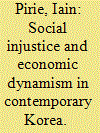| Srl | Item |
| 1 |
ID:
068681


|
|
|
| 2 |
ID:
148307


|
|
|
|
|
| Summary/Abstract |
Korean policy-makers constructed the global economic crisis as a purely external threat to the domestic economy. This understanding of the crisis supported a selective retreat from neo-liberalism. More problematically, the construction of the crisis as an exogenous phenomenon allowed policy-makers to focus on maintaining short-term growth without seriously addressing the structural weaknesses of the economy that the crisis should have drawn attention to. Levels of household debt in Korea have risen since the crisis and are considerably higher than in the USA. Equally, the economy remains over reliant on exports as a source of growth.
|
|
|
|
|
|
|
|
|
|
|
|
|
|
|
|
| 3 |
ID:
113721


|
|
|
|
|
| Publication |
2012.
|
| Summary/Abstract |
A key theme within the literature on the evolution of the Korean political economy since the 1997/8 crisis has been the extent to which Korea remains a 'developmental state' or has pursued radical neoliberal reform. These debates have not only reflected a concern with understanding the Korean economy but with a wider set of questions relating to the future of capitalist diversity within a globalized economy. By the late 1980s Korea had come to be regarded as a model of successful state-led late capitalist development. Korean modern economic history has insured that questions relating to the extent that it has pursued neoliberal reform have been of keen interest to students of political economy globally. This paper argues that substantive neoliberal reform has taken place in Korea since 1997. The thesis that a new 'developmental state' is in process of consolidating itself is simply wrong. However, the state's reform program interacted with material conditions and political coalitions at the meso level in a complex and uneven manner. In certain critical sectors, such as finance, a neoliberal regulatory regime has been consolidated. In others, such as telecommunications, developmentalist regulatory structures have proven to be highly resilient. In order to fully understand the complexity of the contemporary Korean political economy it is necessary, therefore, to prioritize the importance of meso-level analysis.
|
|
|
|
|
|
|
|
|
|
|
|
|
|
|
|
| 4 |
ID:
073640


|
|
|
|
|
| Publication |
2006.
|
| Summary/Abstract |
This article examines the processes of labor market restructuring and welfare reform in South Korea since the 1997/98 crisis, arguing that the Korean state-capital complex has succeeded in effecting a substantial redistribution of income from labor to capital. This redistribution of income has played a critical role in enhancing Korea's international competitiveness and in facilitating a return to sustained growth. The principal mechanisms through which this redistribution has been achieved are the intensified exploitation of weaker sections of the proletariat and the reduction of the traditionally more protected organized sections of the workforce in major firms. At the same time, the state has strengthened welfare safety nets and sought to place concerns about structural competitiveness at the heart of the welfare regime through the promotion of vocational training. What has been most striking about the process of welfare reform, however, has been the capacity of the state to limit the growth of welfare expenditures/provision whilst simultaneously creating massive new labor market insecurities. As a result of the success of the Korean state in restructuring labor markets in order to effect a redistribution of income from weaker sections of the proletariat to capital and limiting the growth of social spending we have witnessed a marked increase in inequality since 1997. Korea's apparent success in transforming itself into a competitive, dynamic neoliberal economy must, therefore, be understood as being symbiotically linked to the intensification of inequality.
|
|
|
|
|
|
|
|
|
|
|
|
|
|
|
|